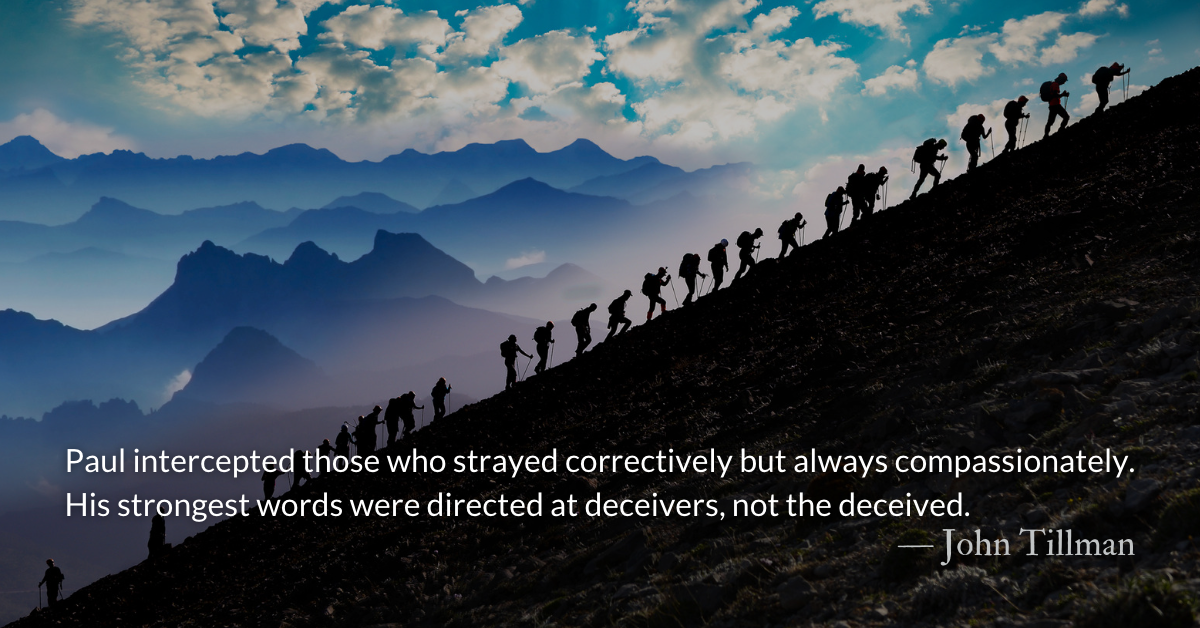Scripture Focus: 1 Thessalonians 3.3-5
3 So when we could stand it no longer, we thought it best to be left by ourselves in Athens. 2 We sent Timothy, who is our brother and co-worker in God’s service in spreading the gospel of Christ, to strengthen and encourage you in your faith, 3 so that no one would be unsettled by these trials. For you know quite well that we are destined for them. 4 In fact, when we were with you, we kept telling you that we would be persecuted. And it turned out that way, as you well know. 5 For this reason, when I could stand it no longer, I sent to find out about your faith. I was afraid that in some way the tempter had tempted you and that our labors might have been in vain.
Reflection: Intercepting Deconstruction
By John Tillman
Paul mentions twice that he can “stand it no longer.” The tension of wondering what had become of the fragile, new faith of the church in Thessalonica was too much for him. Deciding to stay in Athens alone, Paul sent Timothy to check on the believers and report back.
To put that in context, Paul could stand a lot. He could stand imprisonment, stonings, beatings with rods, and many other indignities and sufferings. But to suffer the nagging doubt about the faith of those he cared for was beyond him.
Paul’s concern is two-fold. He was concerned that news of his troubles would distress the believers and that “the tempter” would take the opportunity of distressing news to short-circuit their faith.
Faith, like young plants, is vulnerable when immature. A young plant may be choked out by thorns but a mature tree barely notices their clutching at its bark. Plants mature over time but faith matures only through active cultivation.
However, even mature faith can be harmed and even great trees can be felled. Many in our day have backed away from faith or are reexamining it. Some irresponsible pastors have attacked “deconstructing” Christians as being fooled by or being tools of Satan. Some of these pastors are the same men who caused, endorsed, or ignored the abuse, hypocrisy, and suffering that has fueled the deconstruction movement. They stand throwing gasoline on the fire and blame the devil.
While it is true that spiritual forces and powers attack individuals and the church at opportune times, (Luke 4.13) we can’t ignore the tangible causes. When we find abusive pastors, sweaty and holding an axe by a felled tree, we don’t need to blame the tree for giving in to Satan.
Paul preferred to prevent, rather than condemn, deconstruction. And when faith faltered, Paul intercepted those who strayed correctively but always compassionately. His strongest words were directed at deceivers, not the deceived.
In our age of social media and instant messaging, we don’t need to send Timothy on a hazardous journey to stay in touch, although sometimes discussing faith can feel like a hazardous journey.
Like Paul, let us take the risk and put our energy into cultivating, maintaining, and repairing faith. Who do you know, weak in faith, who needs encouragement? Who do you know strong in faith, who you can turn to?
Divine Hours Prayer: The Request for Presence
I call with my whole heart; answer me, O Lord, that I may keep your statues. — Psalm 119.145
– From The Divine Hours: Prayers for Springtime by Phyllis Tickle.
Today’s Readings
Numbers 21 (Listen 5:03)
1 Thessalonians 3 (Listen 1:44)
This Weekend’s Readings
Numbers 22 (Listen 5:55), 1 Thessalonians 4 (Listen 2:24)
Numbers 23 (Listen 4:01), 1 Thessalonians 5 (Listen 2:37)
Read more about Cultivation Means Tending
We must carefully plant and nurture the early growth of gospel teaching so that it grows strong, healthy, and productive.
Read more about Cultivation Leads to Harvest
How are you dividing up your spiritual harvest? To whom are you passing on biblical knowledge?








